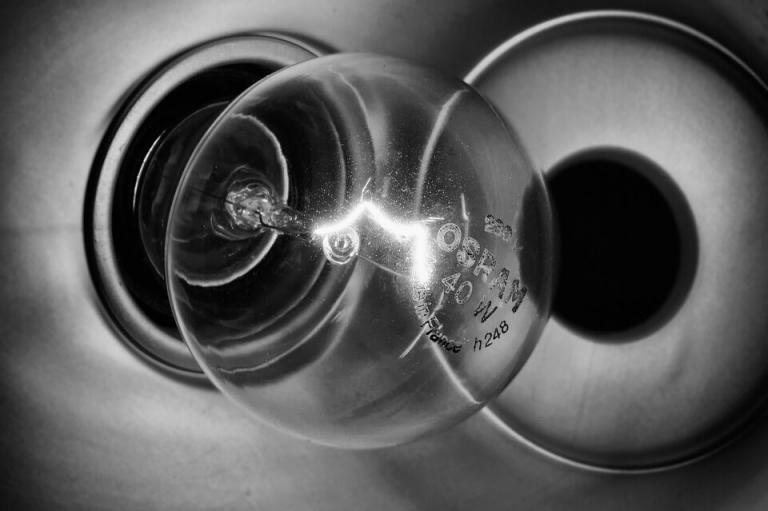Heads Up: This page includes affiliate links, which are marked by an “*”. If you click and purchase, I may receive a small commission at no additional cost to you. But rest assured – my opinions are my own, I would never recommend something I haven’t or wouldn’t purchase for myself.
1. Lightbulbs!
Lighting can take up a large portion of your home’s energy costs, 11% on average, but replacing old incandescent bulbs with newer lighting can dramatically reduce that. You’ve probably seen those odd spiral-shaped light-bulbs in appliance stores and other people’s homes. They’re called Compact Fluorescent Bulbs* (CFLs) and they consume a whopping 75% less energy and last up to 10 times longer than traditional bulbs. If you want to take that energy saving to the next level, you can invest in LED bulbs*, which in many cases have an incredibly long life of 50,000 hours. That’s nearly 50 times the lifespan of an incandescent bulb!



2. Cook Smart
You may think making a home-cooked meal is a good way to save money, but you probably don’t realize your kitchen appliances use a ton of energy. If you’re looking to be energy efficient, then changing up the way you cook may be in order.
- Convection ovens* heat food much more efficiently than conventional ovens and therefore use approximately 20% less energy. It’s recommended that you use a convection oven whenever a conventional oven isn’t necessary.
- It’s likely an obvious fact, but your microwave uses a fraction of the energy that a conventional oven does. Whenever you’re heating up a frozen meal or leftovers, the energy conscious choice is to always use the microwave
- Whenever you do use your conventional oven, make sure to follow a couple simple rules to waste as little energy as possible. Always put your food on the top rack, where it is hotter and will cook faster. Also, make sure to open the oven door as little as possible, as it will let precious heat out and slow the cooking process.
- If you use the stovetop, make sure to place your pots and pans on appropriately sized heating elements. If the heating element is too large, the unused space will generate heat that only goes to waste.
3. Check the Fridge
Unsurprisingly, your refrigerator is a massive consumer of electricity, second only to your air conditioner. Nobody wants to get rid of their fridge though, so instead we will take some steps to make it’s operating as energy efficiently as possible:
- Keep the condenser coils on the back of your fridge clean. They can be wiped down or vacuumed off. Also make sure to keep your fridge at least 4 inches away from the wall so the coils can operate properly.
- Make sure the fridge’s gasket is sealed tight. Place a piece of paper in the door, close it and try to pull the paper out. If it slides out easily, your fridge is not sealing properly and its time to buy a new gasket.
- Make sure the fridge is away from the stove, dishwasher, heat vents or windows. Constant exposure to warm requires them to use more energy to maintain the same temperature.
- How old is your fridge? Refrigerators manufactured before the year 1986 use completely different technology and are 75% less energy efficient. If you’re still using an old fridge it is imperative to update it as soon as possible.


4. A New Water Heater
Large storage water heaters have been the household standard for well over a hundred years, but instantaneous, tankless water heaters have recently become a viable alternative. These models directly heat the water as it travels through an inlaid pipe, delivering hot water to the user without the typical delay of a storage heater. Most importantly, it doesn’t waste energy and have standby costs as the water is heated by demand.

5. Less Laundry is More Savings
You can reduce the amount of water and energy you consume when washing and drying your clothes with these simple tips:
- Always wash a full load. Breaking up your laundry into multiple smaller loads is much less water and energy efficient.
- Use warm water only when necessary. It requires substantially more energy and doesn’t clean much better than cold water.
- If possible, try to air dry your clothes by hanging them on a line or rack.
- If you do use a dryer, make sure to empty out the lint trap before every cycle. Excess lint makes the drying process longer and can even be a fire hazard.
6. Shower Smart
Showering is one of the easiest ways to waste excess water and energy. The average shower in America uses over 17 gallons of the world’s most precious resource! Besides cutting down on your shower time you can also install low-flow, water-efficient showerheads to cut back the speed of water usage. You can test to see if your shower is using water efficiently with a simple trick. Get a empty gallon of jug and cut off the very top. Hold it up to the showerhead and turn on the water. If it takes less than 24 seconds the fill the jug, it’s probably time to buy a new showerhead.

7. Be Cool, but not That Cool
Here in Florida, a massive portion of our energy costs go towards cooling and air. Luckily, there are plenty of ways to mitigate this problem:
- Try relying on your ceiling fan as much as possible and installing a fan in any rooms that don’t have one. Ceiling fans use very little energy compared to a central air conditioning system.
- Replace your air filter consistently and on time. Clogged and damaged air filters can reduce airflow and cause your A/C to work harder than it has to.
- Keep your thermostat at an appropriate temperature for the season. 76 to 78 degrees is recommended for spring and summer and a constant of 68 degree in fall and winter will keep your A/C running as efficiently as possible. You can turn the temperature up even higher when no one is home.
8. Go Outside… for a Minute
Check out your exterior A/C unit. Keeping it clear of mud and debris and out of direct sunlight will keep the unit cool and let air flow freely. All of this will allow the unit to run at maximum efficiency. Try planting some surrounding shrubs and bushes a few inches from the unit to keep it shaded.

9. Don’t Let Air Escape
Make sure all your doors and windows are properly sealed. Massive amounts of energy can be lost when conditioned air escapes through these cracks. The door to the garage is most often overlooked and can be an easy fix by purchasing a door sweep.

10. Get an Energy Audit
Get your utility provider to perform an energy audit for you. Most will do this without a fee. An energy auditor will be able to tell you how to save on energy costs in ways specific to you home. They can also find any issues with your appliances and household utilities that could be wasting energy (poorly installed insulation, leaking pipes, etc.)

Kyle McCuller
Licensed Real Estate Agent
